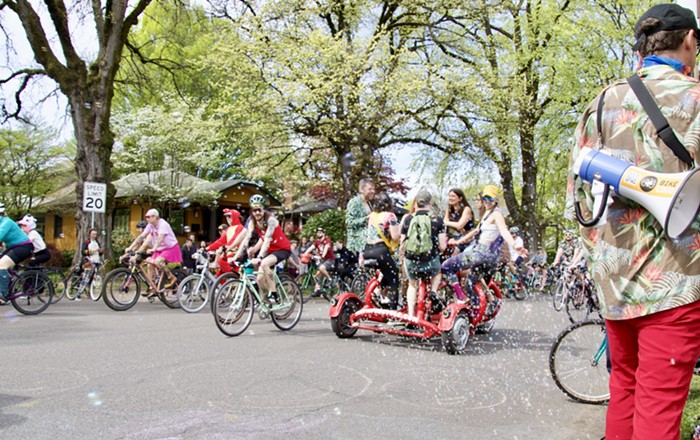PORTLAND DIDN'T have a single bike fatality last year. It's the sixth time this millennium we've kept each of the city's tens of thousands of bicyclists alive for a 365-day stretch, and it's a big deal. But people get hit all the time. A cab thwacked me off my bike last summer as I was minding my own damn business, stationary, in a turning lane ["Run Down," News, Oct 2, 2013]. And when I popped up off the pavement, I wasn't just freaked out—I wasn't sure what to do. The cops came and declined to write a ticket, and I had no idea why, or if the cabbie's insurance company would honor a claim without a citation. It was an unpleasant afternoon.
Maybe you'll never be hit on your bike. Maybe you will. In any case, you want to be prepared. The Mercury asked Portland bicycle attorney Ray Thomas for some insight on how to handle the first, crucial minutes after a crash.
-Dirk VanderHartTHE BIGGEST MISTAKE you can make is to just shake it off. Even when the law is on your side, the laws of physics (mass and velocity) usually are not. Fender benders hurt when it's your skin that's in the collision zone.
So if you're struck by a car, there a few simple things to do:
• First, obtain the names and addresses of witnesses. They're required by law to give you their contact info at the scene.
•Second, make sure the driver shows you real ID, not a fake Oregon driver's license. Take a photo of it with your phone.
•Remember, the driver is required to give you their insurance info. If they try to whine and wheedle or pay you with an IOU or personal check, that's a pretty good tipoff they are driving uninsured, which is also against the law. If the driver refuses to provide you with insurance information, call 911 and ask for a police officer to come to the scene.
•And call 911 if you are even the slightest bit injured. You don't have to go to the ER by ambulance if you don't think it's necessary, but it's good to have a police officer arrive at the scene and help exchange info with the driver. It may well be that the driver has outstanding warrants or other issues. The police will not "investigate" the collision unless you go by ambulance to an ER, which is a policy designed to save their time for more serious cases.
•Even if the cops don't ticket the at-fault driver, insurance companies will still pay if you can prove what happened. Take photos of the scene and vehicles, if possible.
•Sometimes—like if you're hurt or stunned—the driver gets away. If that occurs, your own insurance (if you have it) may still cover your injuries. Collect what information you can, call 911, and tell them you are the victim of a hit and run.
•Most property damage and minor injury cases can be handled solo, but if you can find a lawyer to answer your questions, then you at least have some backup.
Want to know more? Our downloadable book Pedal Power (stc-law.com/pedal-power.html) has chapters on what to do after a collision, basic traffic law, insurance law, and the legal requirements for an insurance company's behavior toward claimants.
If you feel like you are getting shuffled or pushed around, call a lawyer who handles bicycle cases.
Don't accept insult after injury.














